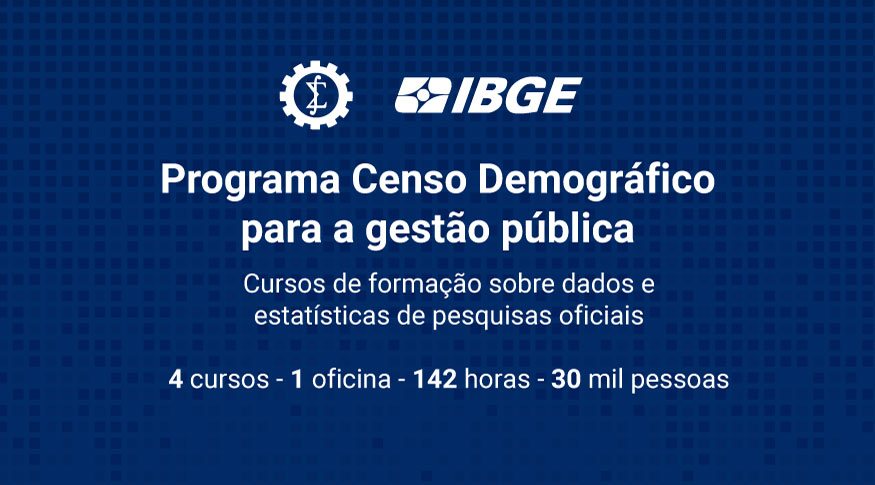ENCE
IBGE launches set of courses on Population Census for Public Management
December 07, 2023 02h30 PM | Last Updated: December 13, 2023 09h41 PM

The IBGE launched, in the Federative Caravan of Ceará, in Fortaleza, thus Thursday (7), the program Population Census for Public Management, a group of courses taught by the IBGE’s National School of Statistical Sciences (ENCE) to prepare public managers to use statistical data and data from official surveys based on the 2022 Population Census. Registration will be opened in April 2024, at the IBGE website, and the online course, is expected to start in May.
“The program has the objective of facilitating and enabling the use of information from the 2022 Census by municipal managers and technicians aiming at the coming cycle of pluriannual planning and the development of public policies the best way possible,” says Paulo de Martino Jannuzzi, head of the IBGE’s National School of Statistical Sciences (Ence), who adds that “the courses will help public managers gain more knowledge about economic characteristics, the productive base, and the labor market for local development projects and plans aimed at strengthening of the environmental issues in the public municipal agenda”.
The purpose of “Population Census for Public Management” is to multiply public statistical information that foster the debate about the problems, demands and priorities of the Brazilian society in coming years. The themes include social policies such as Education, Health, Housing, strategies for economic development, employment Generation and productive inclusion, and also projects in sustainable development, environmental protection and management.
A total of 142 hours will be subdivided into four self-instructional courses, of conceptual, applied and instrumental type, and a workshop to train multipliers having as target public technicians and managers from municipalities and states in Brazil. The courses can be selected individually, or taken as a complete set, which results in more complete preparation.
ENCE estimates the program might train about 30 thousand people all over Brazil. Besides public municipal and state managers, the courses are also aimed at technicians of the several IBGE branches, civil society organizations, members of public policy councils, professors and researchers.
According to Ana Carolina Soares Bertho, ENCE’s coordinator for training and improvement ENCE, making this program available is a matter of democracy. “All the information produced by the IBGE is public and provided for free for anyone to download and use it, but not many people are aware of that. What we want from this program is to make access to statistical and geographic information more democratic, allowing technicians and public managers to employ them in their everyday activities,” said Ana Carolina Bertho, in the opening ceremony of the Federative Caravan program, whose sixth edition is being held on Thursday, 7, and on Friday, 8, in Fortaleza (CE), and to which the IBGE has been invited.
See below the content of the program: Population Census for Public Management, by ENCE:
-
The role of the IBGE and the importance of the Population Census (20hs)
Introduction to surveys conducted by the IBGE, such as the 2022 Population Census.
Making participants more familiar with the types of data collected and with the importance of information for the elaboration of municipal public policies.
-
Concepts and applications of the Population Census for economic development (30hs)
Relationship between data from the Population Census and municipal economic development.
Using demographic data to promote economic growth and sustainability, departing from problem-situations.
-
Concepts and applications of the Population Census in public policies (30hs)
Relationship between Population Census data and the elaboration of municipal public policies.
Using demographic data to identify problems, set priorities and develop strategies to improve quality of life, departing from problem-situations.
-
Concepts and applications of the Population Census for sustainable development (30hs)
Relationship between data from the Population Census and municipal sustainable development.
Using demographic data to promote public policies that deal with the environment and future generations departing from problem-situations.
-
Training workshop for multipliers: elaboration of public policies based on data from the IBGE (32hs)
Elaboration of specific diagnoses in concrete cases for the use of statistical information in public policies, under the guidance of a specialist.
Exemples of activities:
-
Elaboration of diagnoses for the municipal Pluriannual Planning, based on SIDRA data;
-
completion of municipal sector plans in health, education and municipal assistance;
-
elaboration of specific diagnosis such as child labor, school failure, adult illiteracy, teenage pregnancy, etc.;
-
challenges in the combat to fake news at municipal level based on data generated by the IBGE;
-
use of additional tools for consultation and dissemination of geostatistical information by the IBGE;
-
planning for offer of the workshop at microregional level aiming at the multiplication of knowledge among technicians, councilors and the society of the same occupation area as the participant.




















